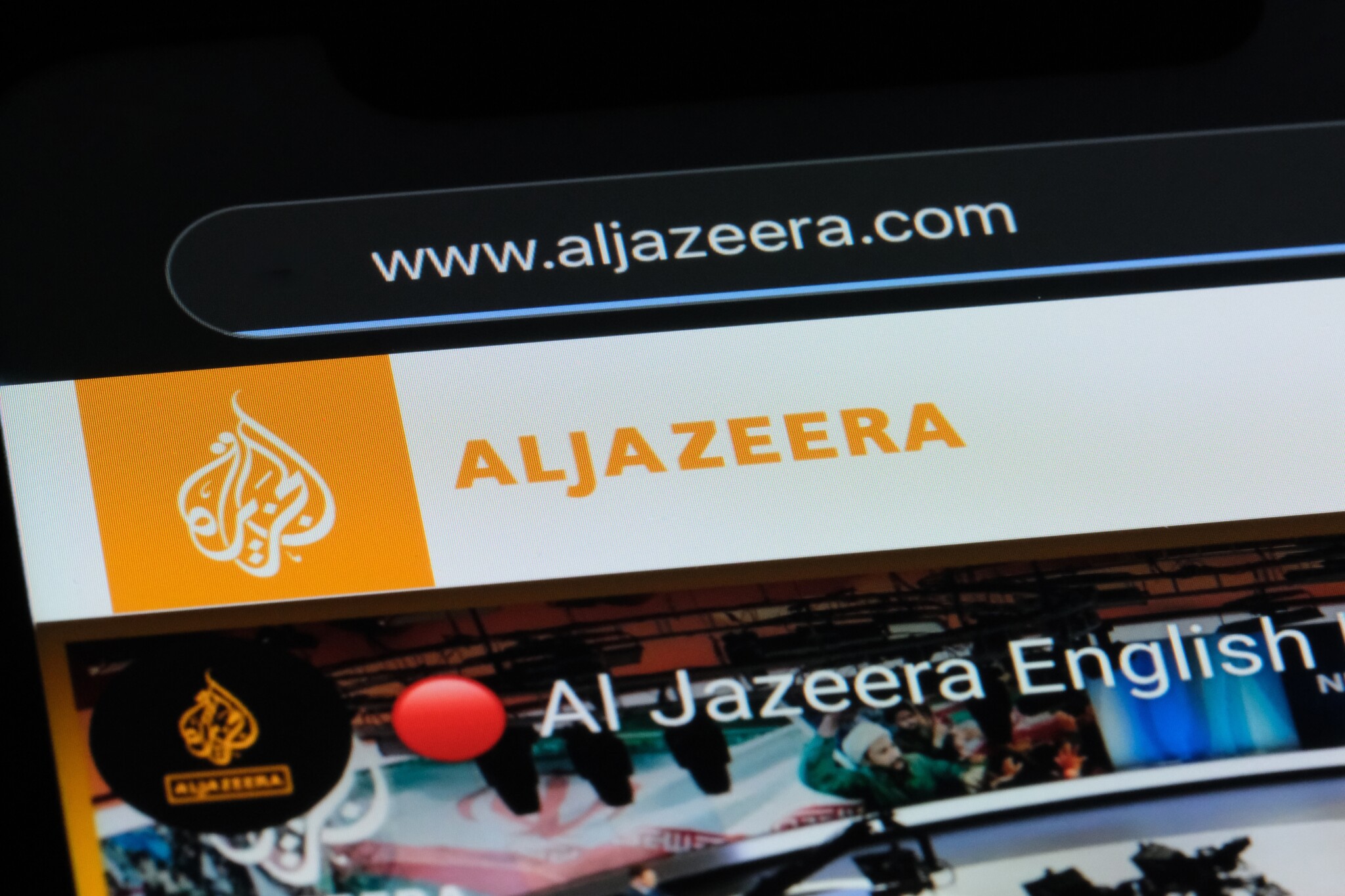
Al Jazeera’s ethics instructor Khamaiseh led a webinar on bias—despite a history of glorifying Hamas and spreading hate against Jews online.
The Qatar-based Al Jazeera Media Institute recently hosted a webinar for journalists about detecting media bias to coincide with Press Freedom Day. One big problem: Muhammad Khamaiseh, the Al Jazeera instructor who specializes in “journalism ethics”, himself has a record not only of media bias but of hatred and discrimination. That’s quite an ethical dilemma, an area in which he claims to be an expert, and it’s also a dilemma for Al Jazeera, the organization for which he frequently acts as a public standard bearer.
Khamaiseh holds a master’s degree in media and cultural studies, is an editor at the Department of Media Initiatives at the Al Jazeera Media Institute, is a member of the Al Jazeera Journalism Review’s editorial team, and oversees its Research Fellowship Program. But despite his impressive CV, Khamaiseh has used social media to spread hate against Jews instead of using it to gather information for stories.
Enjoy independent, ad-free journalism - delivered to your inbox each week
“Jews have been known for centuries to be cunning thinkers, and currently, the entire global economic system is under their control”, he posted on his X account in August 2018, six months after he started working at Al Jazeera, amplifying a hateful canard against an entire faith population.
Back in July 2014, at the height of an expanded military confrontation between Israel and Hamas, Khamaiseh expressed disturbing support for Hamas’ Izz ad-Din al-Qassam Brigades when he cruelly mocked the suffering of Jews, laughing — yes, actually typing out the sound of laughter — at the idea of them being left orphaned. “The summer schedule of Izz ad-Din al-Qassam Brigades… By God they are not slacking off on going after the Jews, not even allowing them to sleep in the morning as they would like. Hahahaha.”
Izz ad-Din al-Qassam was a cleric who formed an early Islamist group that terrorized and murdered Jews in Mandatory Palestine in the 1930s. The brigades that committed the atrocities of October 7, 2023, which massacred nearly 1,200 people from more than 40 nationalities and took 251 people hostage, are named after him.
Izz ad-Din al-Qassam was a cleric who formed an early Islamist group that terrorized and murdered Jews in Mandatory Palestine in the 1930s. The brigades that committed the atrocities of October 7, 2023, which massacred nearly 1,200 people from more than 40 nationalities and took 251 people hostage, are named after him.
Khamaiseh is the author of the Al Jazeera Media Institute’s A Guide to Avoiding Discrimination and Hate Speech in the Media. The guide includes chapters such as How Do Discrimination and Hate Speech Happen in the Media?; Anti-Discrimination and Hate Speech Laws as a Means of Suppressing Freedom of Expression; Objective and Ethical Coverage to Avoid Discrimination and Hate Speech; and the ironically titled chapter Important Questions to Ask Yourself.
Khamaiseh advises journalists on legal ramifications of discrimination to avoid singling out people on the basis of race, color, ancestry, or ethnicity “in a way that prejudices their enjoyment of or recognition of their human rights”. Apparently seeing himself as immune from his own purported standards, he writes, “In a media context, discrimination can occur through negative framing of individuals or groups based on their identity and with the aim of inciting hatred or negative feeling against them.”
In the guidebook, parts of which appear in other sections of the Al Jazeera Media Institute’s website, Khamaiseh writes that the resource “can be thought of as a roadmap that will help journalists to isolate their pieces from their own personal beliefs and biases”, “provide them with tools to deal with the moral dilemmas that confront them”, and “familiarize them with the boundaries between legally acceptable journalism and hate speech and discrimination as prohibited by international law”.

Khamaiseh repeatedly praised Hamas, glorifying attacks on Jews and calling jihadists “steadfast fighters” who resist the “Zionist enemy.”
Khamaiseh, who counsels his students to “treat our audiences with due respect”, has celebrated Hamas’ military arm when it killed Jews, whom he refers to as Zionists. Lauding murder, he posted on X in 2014 that “God is Great and glory belongs to God. Al Qassam Brigades announces the killing of 6 Zionists, as one martyr from the Brigades was killed during a landing operation.”
These were not isolated posts but part of a pattern of praising Hamas. In another instance, referring to those who engage in violent jihad, he cheered in a post, “A salute of reverence to the steadfast fighters standing against the brutal Zionist enemy in Hebron … #Hamas_Will_Not_Kneel.” Elsewhere he posted, “This is why we love Hamas”, ending his comment with a smiley face.
There is strong evidence that at least six Gaza-based Al Jazeera journalists reportedly joined Hamas and Palestinian Islamic Jihad in carrying out the October 7 atrocities in southern Israel, allegations the network denies. Some of the evidence includes the reporter-operatives’ own footage participating in the attack.
Al Jazeera and its affiliates’ royal Qatari funders have invested heavily in positioning the Al Jazeera web of platforms as a tech-savvy ecosystem, seeking to appeal to Western audiences. Tech-savvy as it may be, Al Jazeera is the Qatari government’s soft-power tool to amplify and promote the ideologies of Hamas and the Muslim Brotherhood. The Brotherhood’s goal is to create an Islamic state where Islamic law, or Sharia, governs society.
Qatar’s strict media laws prohibit “any criticism” of the Emir of Qatar, and media outlets in the wealthy emirate require government approval before reporting on Qatar’s armed forces, its banks, and certain judicial proceedings.
Tempting as it may be to accept the emirate’s financial largesse, global media entities that take funds from Qatari government patrons, including, but not limited to, through the Al Jazeera Media Institute and other Al Jazeera Media Network platforms, should be held accountable for their ethically and journalistically problematic deals.
It is noteworthy that after additional public revelations about Al Jazeera’s relationship with Hamas following the October 7 massacre, Northwestern University cut ties to Al Jazeera, which had joint programs in the Illinois university’s Doha campus. Northwestern has received over $500 million in contracts from Qatar since 2007, according to U.S. Department of Education data.
It is noteworthy that after additional public revelations about Al Jazeera’s relationship with Hamas following the October 7 massacre, Northwestern University cut ties to Al Jazeera, which had joint programs in the Illinois university’s Doha campus. Northwestern has received over $500 million in contracts from Qatar since 2007, according to U.S. Department of Education data.
In recent weeks, thousands of Gazans protested against not only Hamas’ brutal rule of Gaza but also against Al Jazeera itself as Hamas’ mouthpiece, chanting “barra, barra, barra [out, out, out] Al Jazeera”. The channel’s own coverage did not reflect the tagline on the bottom of the Institute’s page that claims, “You can count on Al Jazeera for truth and transparency.” Instead, it reportedly hoisted anti-Israel signs among the crowd, filmed it, and disingenuously portrayed the protesters’ actual anger at the network as anger at Israel.
In another booklet called “Do Muslims Scare You: A Guide for Journalists”, for which he served as editor, Khamaiseh advises reporters to “connect Islamophobia with anti-Semitism and other forms of racism”. The guide concludes with a “checklist” of “red flags” that reporters should use to check against their own biases. One of the questions they need to ask, his guide says, is, “Am I repeating a libel or a slander against [people] if my source is making vicious claims or remarks?”
Khamaiseh would do well to check his own words for these red flags. And those journalists and media outlets that collaborate with Al Jazeera Media Institute should check the myriad red flags associated with their collaboration.
Toby Dershowitz is managing director of FDD Action, a non-partisan organization advocating for effective policies to promote U.S. national security and defend free nations. Eitan Fischberger is an independent researcher, analyst, and writer. Follow them on X: @tobydersh and @efischberger.




Comments (0)
Only supporting or founding members can comment on our articles.